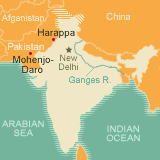The indian contention of owning anything in the Indus Valley Civilisation is zero

in itself, because the vast majority of modern indians have no link what so ever to IVC and the people that lived their.
And I am glad that science is now acknowledging Ancient Pakistan, thank you (mr Kaid).
Pakicetid - Wikipedia, the free encyclopedia
Pakicetus.
Wikispecies has information related to: Pakicetidae
Pakicetids or Pakicetidae are a carnivorous mammal family of the suborder Archaeoceti which lived during the Early Eocene to Middle Eocene (55.8 mya—40.4 mya) in Pakistan and existed for approximately 15.4 million years.[1]
As Cetacea, Pakicetidae precede the whales and dolphins in transition from land. Because their fossils were found near bodies of water, they are presumed to have spent part of their life in water.
Pakicetus was the first discovered in 1983 by Philip Gingerich, Neil Wells, Donald Russell, and S. M. Ibrahim Shah, and all species are known only from a few sites in Pakistan, hence the name of the first genera and the family as a whole. The region is believed to have been coastal to the Tethys Sea when the pakicetids lived, some 53 million years ago.
The pakicetids are presumed to be ancestors of modern whales because of the three following features unique to whales: peculiarities in the positioning of the ear bones within the skull, the folding in a bone of the middle ear, and the arrangement of cusps on the molar teeth. The current theory is that modern whales evolved from archaic whales such as basilosaurids, which in turn evolved from something like the amphibious ambulocetids, which themselves evolved from something like the land-dwelling pakicetids.
When this prehistoric animal was discovered, some nationalist indian intellectuals tried their best, to get india's name on to it, but Pakistani intellectuals successfully argued that since this animal lived on the land mass of Pakistan, it should be named thus.













 in itself, because the vast majority of modern indians have no link what so ever to IVC and the people that lived their.
in itself, because the vast majority of modern indians have no link what so ever to IVC and the people that lived their. 
